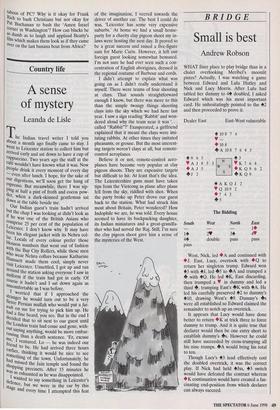Country life
A sense of mystery
Leanda de Lisle
The Indian travel writer I told you about a month ago finally came to stay. I went to Leicester station to collect him but arrived early and sat down to have a cup of eaPpuccino. Two years ago the staff at the café wouldn't have known what it was. Now People drink it every moment of every day — even after lunch. I hope, for the sake of °lir digestions, we'll soon get the hang of espresso. But meanwhile, there I was sip- Ping at half a pint of froth and cocoa pow- der, when a dark-skinned gentleman sat down at the table beside me. Our Indian guest's train hadn't arrived bat the chap I was looking at didn't look as if he was one of the British Asians who c°, niPrise 25 per cent of the population of 'Leicester. I don't know why. It may have been his elegant jacket with its Nehru col- lar.
61.1:Amon Locals of every colour prefer those numbers that went out of fashion With the Bay City Rollers, while those men Who wear Nehru collars because Katharine 14.a1flnert made them cool, simply never visit Leicester. Unsettled, I got up and ran around the station asking everyone I saw in uniform if the train had got in early. Of course it hadn't and I sat down again as uncomfortable as I was before. 1 worried that if I approached the stranger he would turn out to be a very fierce Persian mullah who would put a fat- 19(th on me for trying to pick him up. He had. a fine beard, you see. But in the end I decided that to sit next to our guest until the London train had come and gone, with- out saying aying anything, would be more embar- rassing as .-- than a death sentence. 'Er, excuse 111F,' I ventured. Lo — he was indeed our mend to be. He had arrived three hours earlier, thinking it would be nice to see s,ontething of the town. Unfortunately, he nad missed the Jain temple and found the 811°PPing precincts. After 15 minutes he was as exhausted as he was disappointed. , 1 wanted to say something in Leicester's nefenee, but we were in thc car by this stage and every time I attempted this feat of the imagination, I veered towards the driver of another car. The best I could do was, 'Leicester has some very expensive suburbs.' At home we had a small house- party for a charity clay pigeon shoot my in- laws were hosting the next day. It proved to be a great success and raised a five-figure sum for Marie Curie. However, it left our foreign guest looking somewhat bemused. I'm not sure he had ever seen such a con- centration of English aborigines, dressed in the regional costume of Barbour and cords.
I didn't attempt to explain what was going on as I didn't really understand it myself. There were teams of four shooting at clays. That sounds straightforward enough I know, but there was more to this than the simple twangy things shooting clays into the sky which we had here last year. I saw a sign reading 'Rabbit' and won- dered aloud why the team near it was `. . called "Rabbit"?' Exasperated, a girlfriend explained that it meant the clays were imi- tating rabbits. At other times they imitated pheasants, or grouse. But the most interest- ing targets weren't clays at all, but remote- control aeroplanes.
Believe it or not, remote-control aero- planes have become very popular at clay pigeon shoots. They are expensive targets but difficult to hit. At least that's the idea. The Leicestershire guns must have taken tips from the Vietcong as plane after plane fell from the sky, riddled with shot. When the party broke up Peter drove our guest back to the station. What had struck him most about Britain, Peter wondered? How Indophile we are, he was told. Every house seemed to have its backpacking daughter, its Indian miniatures and a great-grandfa- ther who had served the Raj. Still, I'm sure the clay pigeon shoot gave him a sense of the mysteries of the West.


























































 Previous page
Previous page